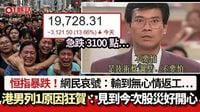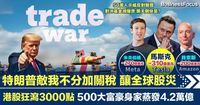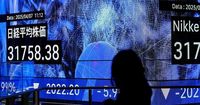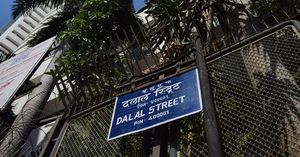In a dramatic escalation of global trade tensions, U.S. President Donald Trump has initiated a sweeping tariff war that has sent shockwaves through financial markets worldwide. This aggressive move has not only triggered significant stock market volatility but has also led to a catastrophic crash that has affected economies across the globe, particularly in Asia.
On April 7, 2025, the Hang Seng Index in Hong Kong plummeted by over 3,100 points, breaking through the crucial 20,000-point mark, while Japan's Nikkei 225 index fell by more than 8%, prompting a circuit breaker to halt trading. These developments come on the heels of an unprecedented two-day bloodbath in U.S. stocks, where the S&P 500 lost a staggering $540 billion USD (approximately 4.2 trillion HKD) in value.
The catalyst for this turmoil was Trump’s announcement of steep tariffs on a variety of goods from global trading partners, with a 34% tariff on Chinese imports and a 20% tariff on European goods. Analysts had anticipated some level of tariffs, but the scale and scope of these increases far exceeded market expectations, igniting fears of a full-blown trade war.
The immediate consequences were dire. The Dow Jones Industrial Average dropped by 2,231 points, marking a weekly decline of 9.08%. The S&P 500 recorded its worst single-day performance since 2020, falling by 5.97% to close at 5,074 points. Moreover, the Nasdaq 100 officially entered bear market territory, having fallen over 20% from its high in February 2025.
As the global markets reacted, the fallout was swift and severe. Wealthy individuals around the world saw their fortunes evaporate, with the Bloomberg Billionaires Index reporting a combined loss of $536 billion USD among the world's 500 richest people over just two days. Notably, Elon Musk, the founder of Tesla and SpaceX, experienced the most significant loss, with his net worth dropping by $310 billion USD (approximately 2,418 billion HKD) in that time frame.
In Hong Kong, reactions were mixed. While many investors expressed despair over their losses, with some lamenting, "Losing so much on stocks, I have no choice but to return to work," others saw opportunity in the chaos. One individual sparked controversy online by stating he was "happy to see the stock market crash" as it presented a chance to buy stocks at lower prices. This sentiment, however, was met with backlash, with critics accusing him of being callous in the face of widespread financial distress.
Globally, over 1,200 protests erupted across the United States in response to Trump's tariff policies, with an estimated 500,000 participants voicing their dissatisfaction. Demonstrators in cities like New York and Chicago carried signs reading "Stop the Tariff War" and "Save the Economy," highlighting the anxiety surrounding job losses and rising prices as a result of the tariffs.
In the aftermath of the crash, hedge funds faced unprecedented pressure, with reports indicating that banks were undertaking the largest margin call actions since the onset of the COVID-19 pandemic. Morgan Stanley data revealed that long-short hedge funds in the U.S. suffered an average loss of 2.9% last Thursday, the largest single-day drop since 2016. Concerns grew that a cascade of hedge fund failures could trigger a systemic crisis, leading to further indiscriminate selling.
As the situation escalated, more than 50 countries reached out to the White House, hoping to persuade the Trump administration to reconsider its tariff strategies. However, U.S. Secretary of Commerce Wilbur Ross confirmed that the tariff measures would not be delayed and would remain in effect for several days or even weeks, leaving many nations scrambling to adapt.
The repercussions were felt across Asia, with stock markets in countries like South Korea, Taiwan, and Singapore all experiencing steep declines. The Taiwan Stock Exchange, for instance, fell by over 2,086 points, marking a drop of more than 9.7% and leading to its first-ever trading halt. The KOSPI in South Korea dropped 5.26%, triggering a similar suspension of trading.
Amidst this turmoil, oil prices also took a hit. Brent crude futures fell by 3.5%, reaching their lowest levels since April 2021. Analysts warned that the ongoing tariff war could exacerbate inflationary pressures, further destabilizing the global economy.
Market analysts remain divided on the future trajectory of the markets. Some, like Morgan Stanley's David Lebovitz, predict a rising risk of recession in the U.S., suggesting a 40% chance of a global stock market crash if the Federal Reserve does not act swiftly to lower interest rates. Others, such as Bank of America strategist Michael Hartnett, are even more pessimistic, asserting a 60% probability of a market crash, urging investors to reduce exposure to high-risk assets.
Despite the widespread panic, a few analysts offered a glimmer of hope, suggesting that the high leverage in the markets was gradually easing, which might present opportunities for a rebound. However, many investors are advised to tread carefully, especially in light of the looming uncertainty surrounding Trump's tariff policies.
As the world watches closely, the question remains: Can Trump maintain his hardline stance on tariffs, or will mounting political and economic pressure force a change in strategy? For now, investors and everyday citizens alike are left grappling with the fallout from this unprecedented financial upheaval, with the potential for further volatility looming on the horizon.






